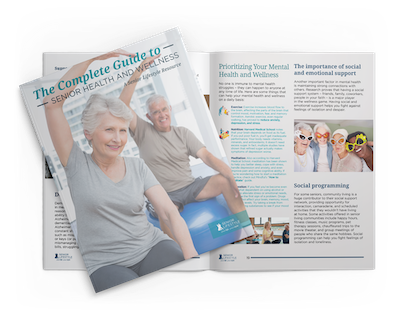If you’re not getting enough vitamins and minerals in your daily diet, your doctor may recommend dietary supplements. These supplements can add nutrients and vitamins to your diet as you age, or can help lower your risk of health problems such as arthritis or osteoporosis.
Almost 3 in 4 Americans 60 and over (74.3%) take supplements, according to the U.S. Centers for Disease Control and Prevention. Vitamin supplements might be the best way for some seniors to stave off some of the effects of aging.
Find out more about the foods seniors should eat, when they should take vitamin and mineral supplements, and what supplements older adults should take.
Should Seniors Take Vitamins and Supplements?
Of course, the best way for seniors to maintain their health is through nutrition and exercise. Exercise helps build up your body and fights conditions like hypertension and excess weight. Nutrient-dense foods contain other things that maintain your health, like fiber.
But not everyone can eat enough food to maintain health. Medicare Advantage lists several reasons why seniors might need to take supplements.
- Appetite loss is common among older people.
- Bodies are less efficient at absorbing key nutrients from food.
- Bones become more brittle.
- Diseases and conditions can suppress the body’s ability to absorb nutrients.
- Medications can flush out nutrients before they can be properly absorbed or can block them from being absorbed at all.
- Older people may not cook as often as they once did, and ready-to-eat meals can lack vitamins and nutrients.
- Seniors may not get as much sunlight exposure as they once did, which causes vitamin D levels to drop.
- Some healthy vitamin-rich foods can become difficult to chew or digest.

Download The Complete Guide to Health & Wellness for Seniors
As people grow older, their health and wellness needs change. Read our eBook, “The Complete Guide to Health & Wellness for Seniors” for everything you need to know about staying healthy and happy as we age.
Download the GuideThe 5 Best Supplements and Vitamins for Seniors
If you do need to supplement your diet, the National Institutes of Health recommends that you look for a supplement that contains the vitamin or mineral you need without a lot of other unnecessary ingredients.
Read the label to make sure the dose is not too large. Too much of some vitamins and minerals can be harmful, and you might be paying for supplements you don’t need. Your doctor or pharmacist can recommend vitamin supplements for seniors and brands that fit your needs.
Here are five of the top vitamin supplements for seniors, along with an additional recommendation.
Calcium
Calcium is important for strong bones and teeth, so this mineral is especially necessary for older people who are at risk of bone loss. Without sufficient calcium, seniors can face bone fractures. Calcium is found naturally in milk and milk products, canned fish with soft bones, dark-green leafy vegetables like kale, and foods with calcium added, such as breakfast cereals.
Vitamin B12
This vitamin keeps the body’s nerves and blood cells healthy. B12 is harder for the body to absorb as seniors age. Strict vegetarians and vegans are at greater risk of developing vitamin B12 deficiency because the vitamin naturally is limited to animal-based foods. Vitamin B12 is found mostly in such products as eggs, fish, meat, poultry and dairy products.
Vitamin B6
This vitamin is needed to form red blood cells. It also helps maintain the health of the connections between the brain and nerve cells. Vitamin B6 supplements are also used to treat diabetes, arthritis and memory loss. Vitamin B6 is found in beef liver, chicken breasts, fish, non-citrus fruits, and potatoes and other starchy vegetables.
Vitamin B9
Also known as folate or folic acid, this vitamin may slow or prevent memory loss in people over 60. Vitamin B9 also helps convert carbohydrates into energy. It can be found in fruits, such as oranges, and vegetables like broccoli, Brussels sprouts and spinach. It can also be found in nuts, beans and peas.
Vitamin D
This vitamin helps maintain bone health, which is especially important for seniors as osteoporosis and weakening bones make falls far more dangerous. Maintaining healthy levels of vitamin D may help reduce the risk of diabetes, heart disease and inflammation, according to research. Vitamin D can be found in fatty fish, fish liver oils, fortified milk and milk products, and fortified cereals.
Multivitamin Supplements for Seniors
Seniors should also consider multivitamin supplements. A good multivitamin supplement might contain many of these vitamins, along with small amounts of necessary minerals. Look for supplements containing acceptable levels of magnesium, potassium, sodium, vitamin A, vitamin C and vitamin E.
Senior Lifestyle Communities Support Your Health
At Senior Lifestyle, our communities are already to help support the whole health of our residents. We feature exercise programs, nutrition programs and general wellness and independence policies as appropriate for each individual.
Find out more about Senior Lifestyle communities near you and reach out today for more information.

